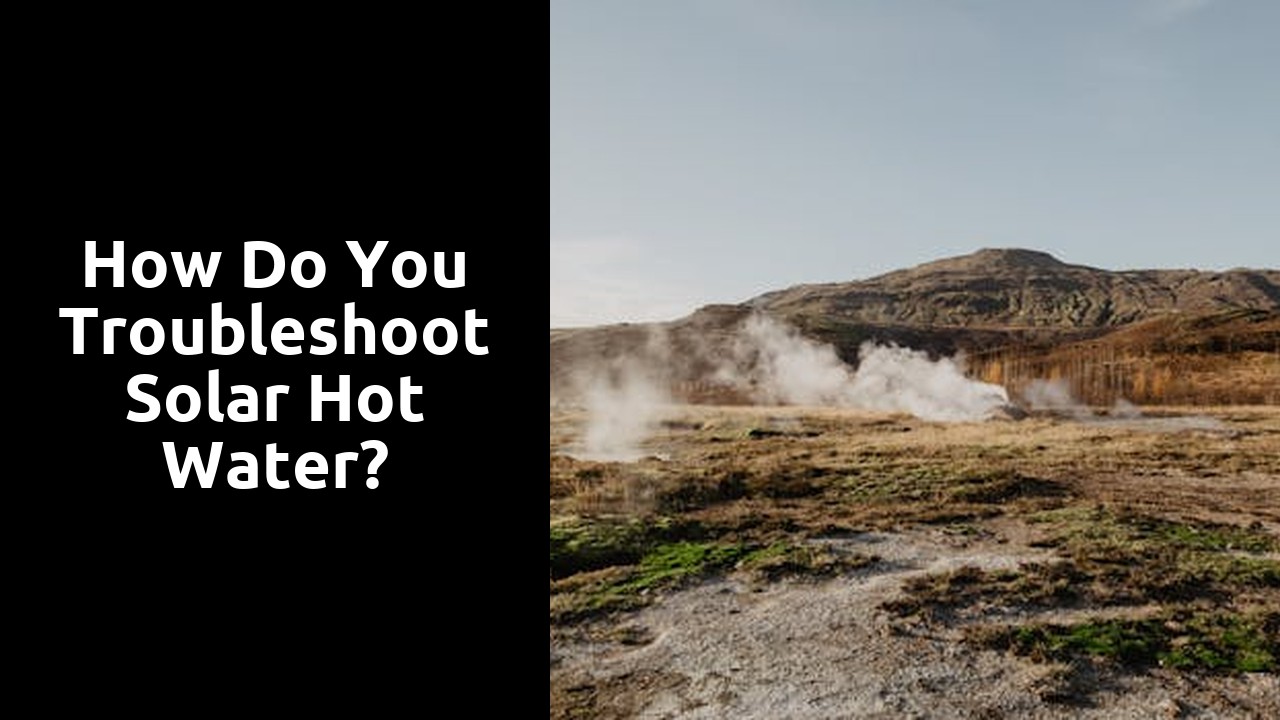
Potential Issues with the Solar Panel Hot Water System Controller
When experiencing issues with your solar panel hot water system, the controller may be at fault. One of the common issues could be a malfunction due to power supply problems. Ensure that the controller is receiving a stable power connection and no loose wires are affecting its operation. Additionally, a reset of the system controller might be necessary to clear any temporary glitches that are impeding its function. Follow the manufacturer's instructions for resetting the controller before proceeding with further Solar Hot Water System Troubleshooting.
Another potential issue with the system controller could be related to the settings or programming. Check that the settings are configured correctly according to the manufacturer's recommendations. In some cases, improper settings may lead to the system not functioning optimally. If needed, reprogram the controller as per the user manual to align it with your hot water usage patterns. Conduct a thorough assessment of the controller to rule out any programming errors that could be hindering the performance of your solar hot water system.
Resetting the System Controller
Resetting the system controller is a fundamental troubleshooting step for resolving issues with your solar hot water system. To initiate the reset, locate the power source of your system and switch it off. Once the power is off, wait for at least 30 seconds before turning it back on. This simple reset action can rectify minor glitches that may be affecting the functionality of the system controller. For a comprehensive evaluation of the system, check the controller settings post-reset to ensure that they are configured correctly.
If resetting the system controller does not resolve the problem, consider consulting the system’s user manual for specific instructions on resetting procedures. Some controllers may require sequential button presses or a distinct reset pattern. Adhering to the recommended reset guidelines can help in identifying any underlying issues within the system. Moreover, keeping a record of performed resets and their outcomes can assist in pinpointing recurrent problems that may require further attention. Solar Hot Water System Troubleshooting is an essential task in maintaining the efficiency of your system and ensuring uninterrupted access to hot water.
Investigating Possible Leaks in Your Solar Panel Hot Water System
When your solar hot water system is not functioning optimally, leaks could be a common culprit. Investigating possible leaks in your solar panel hot water system is crucial to ensure its efficiency and longevity. Start by visually inspecting all components of the system, including the pipes, fittings, valves, and connections. Look for any signs of water dripping, pooling, or unusual moisture around these areas.
If you suspect a leak but cannot visibly locate it, try pressurizing the system to detect any leaks. This can be done by shutting off the supply valve to the solar panel hot water system and monitoring the pressure gauge. If the pressure drops over time, it indicates a leak in the system. Identifying and fixing leaks promptly is essential for the proper functioning of your solar hot water system troubleshooting.
Identifying and Fixing Leak Sources
When dealing with issues related to your solar hot water system, one common problem that can arise is leaks. Identifying and fixing leak sources promptly is crucial to ensure the effective operation of your system. If you notice decreased water temperature or pressure, damp areas around the system, or unusual sounds, it's essential to investigate and address potential leaks promptly.
Begin by inspecting all visible parts of the system, such as pipes, fittings, valves, and the storage tank, for any signs of moisture or dripping water. Use a flashlight to look for any obvious leaks or water stains. Additionally, check the pressure relief valve, as a faulty valve can also cause leaks. Once you have identified the source of the leak, take the necessary steps to repair or replace the damaged components to prevent further complications in your solar hot water system.
Common Problems with the Heat Exchanger in Solar Panel Hot Water Systems
When facing issues with the heat exchanger in your solar panel hot water system, troubleshooting is necessary to identify and rectify the problem promptly. A common difficulty with the heat exchanger is blockages caused by mineral deposits or debris over time. This can impede the efficient transfer of heat, leading to a decrease in the system's overall performance. To address this, flushing the heat exchanger is essential to remove any build-up and ensure optimal functionality. Regular maintenance in the form of flushing can help prevent such blockages and maintain the effectiveness of your solar hot water system.
Another prevalent problem with the heat exchanger is leaks, which can occur due to corrosion or wear and tear. Identifying the source of the leak is crucial to prevent further damage to the system and maintain its efficiency. Effective leak detection and timely repair are essential to ensure the heat exchanger functions correctly. Engaging in thorough inspection and maintenance practices can help mitigate potential issues with the heat exchanger in your solar hot water system, promoting its longevity and optimal performance. Solar Hot Water System Troubleshooting is imperative in addressing such concerns promptly and efficiently.
Flushing the Heat Exchanger for Optimal Performance
Solar hot water systems are a popular choice for households looking to reduce their energy bills and environmental impact. One common issue that can arise with these systems is a decrease in performance over time due to a buildup of sediment in the heat exchanger. Flushing the heat exchanger is an essential maintenance task that helps to maintain optimal efficiency and prolong the lifespan of the system.
To flush the heat exchanger, start by turning off the power to the system and allowing it to cool down. Once the system is safe to work on, locate the drain valve on the heat exchanger and attach a hose to it. Open the valve and let the water flow out, flushing out any sediment or debris that may have accumulated. This simple yet effective maintenance task can help keep your solar hot water system running smoothly and efficiently.
FAQS
Why is my solar panel hot water not working?
There could be several reasons why your solar panel hot water system is not working efficiently. Common issues include problems with the system controller, leaks in the system, and issues with the heat exchanger.
How can I reset the system controller of my solar panel hot water system?
To reset the system controller, locate the reset button on the controller and press it. Follow the manufacturer's instructions for resetting the controller, as the process may vary depending on the brand and model.
What should I do if I suspect there are leaks in my solar panel hot water system?
If you suspect there are leaks in your system, it is important to investigate and address them promptly to prevent further damage. Check for visible leaks around the panels, pipes, and connections.
How can I identify and fix leak sources in my solar panel hot water system?
To identify and fix leak sources, visually inspect all components of the system, including pipes, connections, and seals. If you identify a leak, tighten connections or replace damaged components as needed.
What are some common problems associated with the heat exchanger in solar panel hot water systems?
Common problems with the heat exchanger include sediment buildup, mineral deposits, and corrosion. These issues can hinder the heat transfer process and reduce the efficiency of the system.
How can I flush the heat exchanger of my solar panel hot water system for optimal performance?
To flush the heat exchanger, follow the manufacturer's instructions for your specific system. Flushing the heat exchanger helps remove sediment and mineral deposits, ensuring optimal performance and efficiency."""
